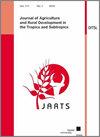Determinants of households’ membership in agricultural cooperatives in Bhutan
Q3 Social Sciences
Journal of Agriculture and Rural Development in the Tropics and Subtropics
Pub Date : 2021-10-05
DOI:10.17170/KOBRA-202107134321
引用次数: 0
Abstract
The Royal Government of Bhutan has been promoting agricultural cooperatives (ACs) in the country; however, the number of people joining ACs is small. This study was conducted to identify the factors influencing households' decision to join ACs in Central Bhutan. A cross-sectional survey was conducted to collect data from 384 households (192 AC members and 192 non-AC members). Trained enumerators collected data in June and July 2018 using structured questionnaires. The binary logistic regression showed that households with older heads of household, being literate, having more family labour, more land under cultivation, owning farm machinery, being further away from a market, and having access to credit increased the likelihood of households joining ACs. Conversely, households earning off-farm income and locating far from the Renewable Natural Resources Centres decreased the likelihood of becoming member of ACs. Additionally, the gender of the head of a household and the number of cattle owned by a household showed no significant influence. As this paper is the first to empirically investigate the determinants of households’ membership in ACs in Bhutan, the findings have some important policy implications. The government should continue to provide in-depth awareness to farmers on concepts and benefits of ACs in retaining existing members and recruiting new members.不丹农业合作社家庭成员的决定因素
不丹王国政府一直在促进该国的农业合作社;然而,加入ac的人数很少。本研究旨在找出影响不丹中部家庭决定加入家政服务的因素。一项横断面调查收集了384个家庭(192个空调成员和192个非空调成员)的数据。经过培训的普查员在2018年6月和7月使用结构化问卷收集数据。二元逻辑回归表明,户主年龄较大、有文化、有更多的家庭劳动力、耕种更多的土地、拥有农业机械、离市场更远、有机会获得信贷的家庭加入联合行动的可能性增加。相反,有非农业收入的家庭和远离可再生自然资源中心的家庭则降低了成为可再生自然资源中心成员的可能性。此外,户主的性别和家庭拥有的牛的数量没有显着影响。由于本文是第一个实证研究不丹家庭成员资格的决定因素,研究结果具有一些重要的政策意义。政府应继续向农民深入介绍农协的概念和好处,以留住现有会员和吸纳新会员。
本文章由计算机程序翻译,如有差异,请以英文原文为准。
求助全文
约1分钟内获得全文
求助全文
来源期刊
CiteScore
2.30
自引率
0.00%
发文量
0
审稿时长
>36 weeks
期刊介绍:
The Journal of Agriculture and Rural Development in the Tropics and Subtropics publishes papers dealing with original research and review papers in the fields of plant production, animal nutrition and animal husbandry, soil science, rural economy and farm management, forestry and forest economy, veterinary hygiene and protection against epidemics.

 求助内容:
求助内容: 应助结果提醒方式:
应助结果提醒方式:


